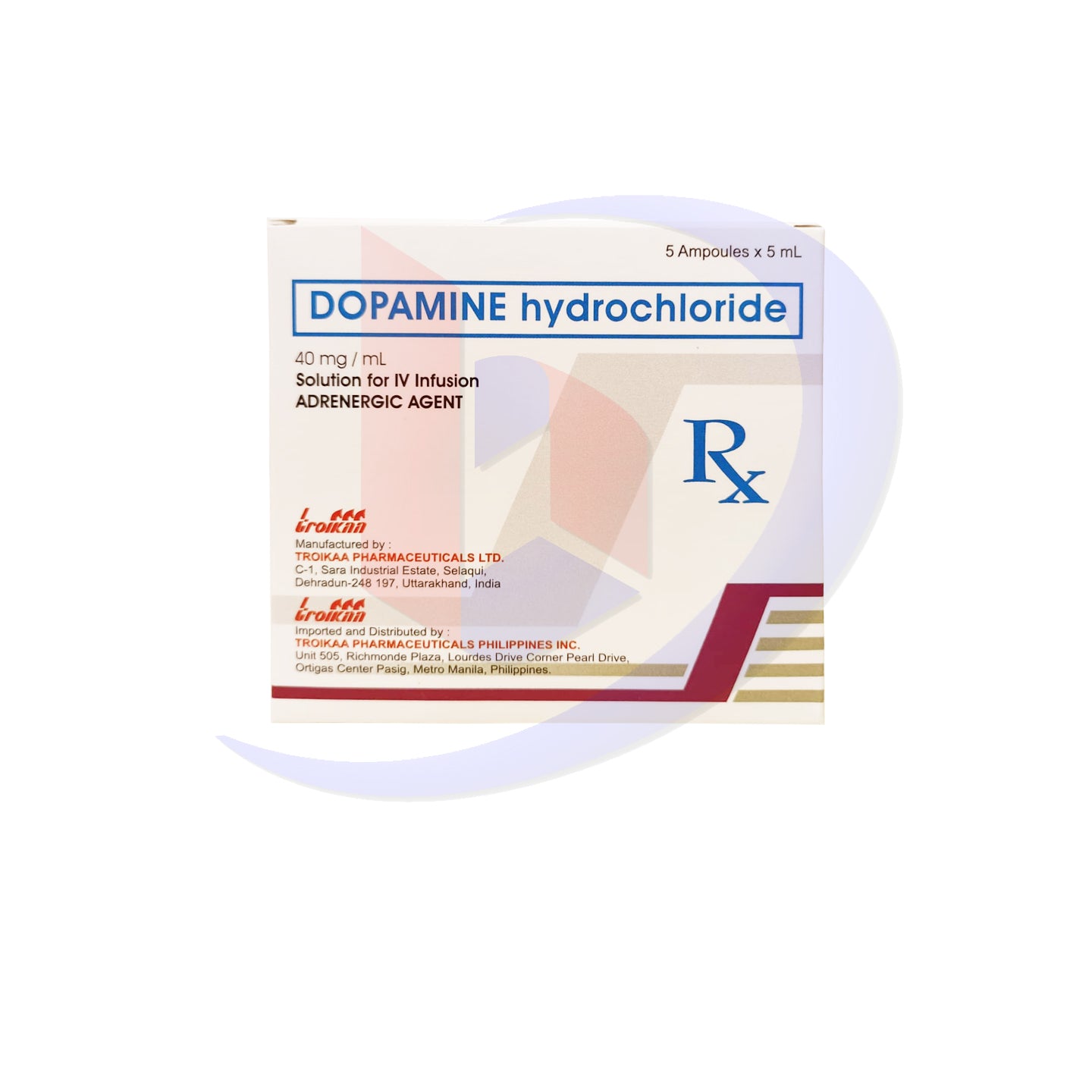Bambang Pharmaceutical Depot Inc.
Dopamine Hydrochloride (Troikaa) 40mg/ml Solution for IV Infusion 5ml x Ampoules 5's
Dopamine Hydrochloride (Troikaa) 40mg/ml Solution for IV Infusion 5ml x Ampoules 5's
Couldn't load pickup availability
40mg/ml Solution for IV Infusion 5ml
Here's a detailed overview of Dopamine Hydrochloride (Troikaa) 40mg/ml Solution for IV Infusion 5ml x Ampoules 5's:
Product Description
Dopamine Hydrochloride (Troikaa) 40mg/ml Solution for IV Infusion is a medication used to treat certain types of shock and heart failure by improving blood circulation and supporting the heart's ability to pump blood. It is provided in 5 ml ampoules, with each ampoule containing 40 mg of dopamine hydrochloride per ml (total 200 mg per ampoule).
-
Formulation: A sterile, clear solution of dopamine hydrochloride for intravenous (IV) infusion.
-
Concentration: 40 mg/ml (each 5 ml ampoule contains 200 mg of dopamine hydrochloride).
-
Packaging: The product comes in a box containing 5 ampoules of 5 ml each, designed for clinical use in emergency or intensive care settings.
-
Mechanism of Action: Dopamine is a sympathomimetic drug that works by stimulating dopamine receptors, leading to improved cardiac output, vasodilation, and increased blood flow to vital organs, especially in shock or heart failure situations.
Indications
Dopamine Hydrochloride (Troikaa) is used for the following medical conditions:
-
Shock: Dopamine is used to treat shock resulting from various causes, such as:
-
Cardiogenic Shock: Often seen in heart failure or myocardial infarction (heart attack).
-
Hypovolemic Shock: Due to significant blood or fluid loss, such as from trauma or severe dehydration.
-
Septic Shock: A life-threatening infection causing systemic vasodilation and low blood pressure.
-
Neurogenic Shock: Caused by spinal cord injury or severe head trauma.
-
-
Acute Heart Failure: To improve cardiac output and increase blood flow to vital organs in patients with acute heart failure.
-
Severe Hypotension: To raise dangerously low blood pressure in patients with hypotension that does not respond to other treatments.
Note: Dopamine is typically administered in a controlled hospital or intensive care setting under close monitoring due to its potent effects on blood pressure and heart function.
Dosages
The dosage of Dopamine Hydrochloride (Troikaa) will vary based on the clinical condition being treated and the patient's response. The following are general dosing guidelines:
-
For Shock (Cardiogenic, Hypovolemic, or Septic):
-
Initial Dose: The typical initial dose is 2 to 5 mcg/kg/min administered as a continuous IV infusion.
-
Maintenance Dose: The dose may be titrated based on patient response, typically ranging from 5 to 20 mcg/kg/min.
-
Maximum Dose: The maximum dose is typically 20 mcg/kg/min, but it can be increased in severe cases under close monitoring.
-
-
For Acute Heart Failure:
-
The infusion rate starts at 2 to 5 mcg/kg/min and can be adjusted depending on the patient’s blood pressure and cardiac output.
-
Note: Dopamine infusion rates should be carefully monitored and adjusted to ensure that the patient receives the correct dose. The infusion is typically diluted with a compatible IV fluid (like saline or dextrose) before administration.
Side Effects
Like all medications, Dopamine Hydrochloride (Troikaa) can cause side effects. Common and serious side effects include:
-
Common Side Effects:
-
Tachycardia (rapid heart rate): Dopamine may cause an increased heart rate, especially at higher doses.
-
Hypertension (high blood pressure): Dopamine increases blood pressure, which can be beneficial in shock but may be problematic in certain patients.
-
Headache: Some patients may experience headaches as a side effect of dopamine infusion.
-
Nausea or Vomiting: Gastrointestinal side effects are possible.
-
Palpitations: A sensation of an irregular or fast heartbeat.
-
-
Serious Side Effects:
-
Arrhythmias: At higher doses, dopamine can cause abnormal heart rhythms, including ventricular arrhythmias.
-
Tissue Necrosis: If the medication leaks out of the vein (extravasation), it can cause severe local tissue damage or necrosis.
-
Myocardial Ischemia: In some cases, dopamine can exacerbate ischemia (lack of oxygen to the heart) in patients with coronary artery disease.
-
Peripheral Vasoconstriction: In some cases, dopamine may cause constriction of peripheral blood vessels, potentially leading to poor blood flow to extremities.
-
Note: These side effects are more likely to occur with higher doses or prolonged use. Patients receiving dopamine should be closely monitored for cardiovascular and metabolic changes.
Contraindications
Dopamine Hydrochloride (Troikaa) is contraindicated in the following situations:
-
Hypersensitivity: Known hypersensitivity or allergy to dopamine or any of its components.
-
Pheochromocytoma: A rare tumor of the adrenal glands that causes excess production of catecholamines (dopamine, norepinephrine), which may interact negatively with dopamine administration.
-
Tachyarrhythmias: Patients with tachyarrhythmias (rapid, irregular heart rhythms) should not receive dopamine as it may exacerbate the arrhythmia.
-
Ventricular Fibrillation: Dopamine should not be used in patients with ventricular fibrillation, as it can worsen the condition.
-
Uncorrected Hypovolemia: Patients who are hypovolemic (have low blood volume) due to blood loss, dehydration, or other causes must have their volume corrected before receiving dopamine to avoid worsening shock.
-
Severe Coronary Artery Disease: Dopamine should be avoided in patients with severe coronary artery disease unless absolutely necessary, as it can increase myocardial oxygen demand, which may lead to ischemia.
Precautions
-
Cardiac Monitoring: Due to its effects on heart rate and blood pressure, patients receiving dopamine should be monitored continuously for any signs of arrhythmias or changes in vital signs.
-
Renal Function: While dopamine may improve renal blood flow at low doses, high doses can lead to kidney damage. Renal function should be monitored closely in patients receiving dopamine, especially in critically ill patients.
-
Extravasation Risk: Dopamine should be administered into a large vein to minimize the risk of extravasation (leakage into surrounding tissue). If extravasation occurs, the infusion should be stopped immediately, and local measures should be taken to prevent tissue necrosis.
-
Adjustments in Special Populations: In patients with severe liver or kidney disease, the dose of dopamine may need to be adjusted, as the clearance of the drug may be affected.
Additional Notes
-
Infusion Rate: The infusion rate should always be adjusted based on clinical monitoring, particularly blood pressure and heart rate. It is recommended that dopamine be administered by experienced healthcare professionals in a controlled setting such as an intensive care unit (ICU).
-
Storage: Dopamine Hydrochloride (Troikaa) should be stored at room temperature in a cool, dry place. Do not freeze or expose to direct sunlight.
-
Use During Pregnancy: Dopamine should only be used during pregnancy if the potential benefits outweigh the risks. It is considered a category C drug (risk cannot be ruled out) during pregnancy. Consult with a healthcare provider before use.
-
Breastfeeding: Dopamine is not expected to significantly affect breastfeeding, but as with all medications, it is advisable to consult a healthcare provider if you are breastfeeding.
Conclusion
Dopamine Hydrochloride (Troikaa) 40mg/ml Solution for IV Infusion is a crucial medication in managing shock, heart failure, and severe hypotension. It works by improving blood flow to vital organs and increasing cardiac output. However, it should only be administered under close medical supervision due to its potent effects on the cardiovascular system. Correct dosage, careful monitoring, and awareness of potential side effects are key to ensuring its safe and effective use. Always consult a healthcare professional before using this product, especially in patients with underlying heart conditions or other comorbidities.
Share

Product Features
Highlights
Details
Lot #
Expiry Date
"For All Your Pharma And Medical Supply Needs"
-
MEDICINES
We offer large range of generics and branded tablets, capsules, topicals, suppositories, drops or suspensions, inhalers and injections.
-
SUPPLEMENTS
High quality yet very affordable vitamins and minerals, specialty supplements, herbals and botanicals, sports nutrition, and weight management.
-
MEDICAL SUPPLIES
We serve all types of medical supplies needed in clinics, laboratories, and hospitals like cottons, gauze, alcohol, swabs, gloves, bandages, lancets, glucometer, etc.
-
MEDICAL EQUIPMENT
We also serve durable and affordable medical devices and equipment needed in clinics, laboratories and hospitals.
Subscribe to our emails
Be the first to know about new collections and exclusive offers of Bambang Pharmaceutical Depot Inc.


